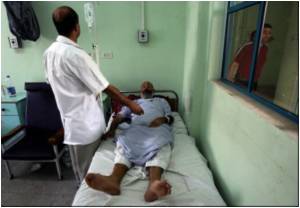A UNC physician has authored an editorial on the cost-effectiveness study of colonoscopy versus computed tomographic colonography (CTC) while screening for colon cancer.

Both CT colonography and colonoscopy examine the inside of the colon (the large intestine) for either cancer or large polyps (growths that could become cancer). CTC colonography does this examination indirectly, using a CT scan (a type of x-ray). Colonoscopy does this examination directly, using a camera on the end of a tube inserted into the colon.
Unfortunately, there has been no "comparative effectiveness" study to compare the benefits and harms of CTC with colonoscopy. So the researchers in the JNCI article used simulation models to compare the two tests in an unscreened population of Medicare beneficiaries ages 65 to 80 years. These models use mathematics to estimate what would happen if one used one test compared with the other.
Russell Harris, MD, MPH, professor of medicine at UNC and a member of UNC Lineberger Comprehensive Cancer Center, wrote the editorial accompanying the cost-effectiveness study.
In his editorial, Harris notes that cost-effectiveness analyses are useful, but that they often cannot include some important considerations. In this case, Harris shows how the cost-effectiveness analysis could not include some of the potential harms of both CTC and colonoscopy. For example, CTC often leads to finding abnormalities outside the colon (such as in the kidneys or adrenal glands) that require further testing and even surgery, yet finding these abnormalities usually does not help people live longer.
Colonoscopy often leads to removing small polyps that do not need to be removed, yet their removal may lead to complications such as excessive bleeding.
Advertisement
Harris is a national expert on cancer screening issues. He has served on the U.S. Preventive Services Task Force, a group that conducts scientific evidence reviews of a broad range of clinical preventive health care services and develops recommendations for primary care clinicians and health systems.
Advertisement
Source-Eurekalert













